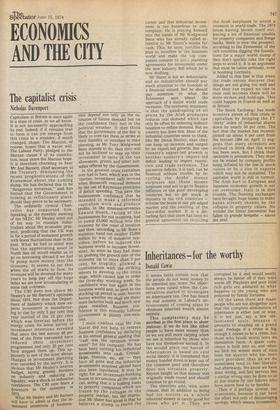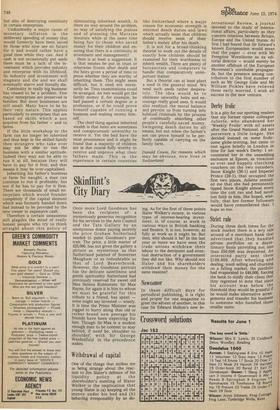Inheritances— for the worthy
Donald Cowie
It seems fairly certain now that the people do not want money to be inherited any more. No objections were raised when the Conservatives started to investigate an inheritance tax. One has heard no real screams at Labour's announcement of coming plans to eliminate inherited wealth almost entirely.
This complacency may be ascribed in the first place to sheer jealousy: if we do not like other people to have more money than us we are still more carping when we see it inherited by those who have not themselves earned it. In the second place our hatred of inheritances is based on cold social theory: it is considered that money handed down is kept out of the common pool and therefore does not circulate properly. Keynes taught us that money was originally made round and should continue to go round.
The theorists add, with some reason, that in addition to being bad for society as a whole inherited money is rarely good for those who get it. They are corrupted by it and would nearly always be better off if they were worse off. Playboys and poor little rich girls are adduced as what happens to the young who are poisoned by family fortunes.
All the same there are many people who are not altogether sure that the complete elimination of inheritance is either just or wise. It is not just, say a few oldfashioned souls, because it amounts to stealing on a grand scale. Perhaps if a crime is big enough it ceases to be a crime, but those who break moral laws do themselves harm. A queer conscience is built into us, and when we filch his winter store of nuts from the squirrel who has been more provident than us we do sometimes tend to feel literally bad afterwards. We know we have done wrong, and feel nervous lest a similar wrong may be done to us in due course by our fellows who have learnt how to be bandits.
Then it is perhaps unwise, say economists, because it can have the effect not only of discouraging savings, which means investment, but also of destroying continuity in certain enterprises.
Undoubtedly a major cause of monetary inflation is the deliberate spending of money that would formerly have been saved by those who now see no future for it and would rather have a good time while they can. And if cash is not occasionally put aside there must be a lack of the investment which provides industry and enterprise with its lifeblood. So industry and investment will stagnate and die and we shall eventually starve and literally die.
Continuity in really big business has ceased to be a problem. Few major enterprises are preserved in families. But most businesses are still small. Many have to be by their very nature. This applies particularly to enterprises that are based on skills which a son acquires from his father — and to farms.
If the little workshop or the farm can no longer be inherited and thus kept in the skilled family then strangers who take over may not be able to run the business with a similar aptitude. Indeed they may not be able to run it at all, because they will have to pay for it first, and that means it may be over-capitalised.
Inheriting his father's business or farm for naught, a man can continue to run it profitably, but not if he has to pay for it first. There are thousands of small enterprises which would founder completely if the capital element which was formerly handed down had instead to be provided by the new owner in expensive cash.
Therefore a certain uneasiness still plagties the mind of really honest people who try to think straight about this policy of eliminating inherited wealth. Is there no way around the problem, no way of satisfying the jealous and of pleasing the Marxian theorists while at the same time being fair to those who saved money for their children and ensuring that there is a continuity in investment and management?
Here is at least a suggestion: It is that estates be put in trust or otherwise frozen after death and the heirs given a period of time to prove whether they are worthy of inheriting them. This might seem difficult, but it need not necessarily be. Thus examinations could be arranged. An heir would get the family money if, for example, he had passed a certain degree in a profession, or if he could prove himself capable of running a business and making money himself.
The chief thing against inherited wealth is that heirs are sometimes and conspicuously unworthy to receive it. Yet the bad have the most prominence and it might be found that a majority of children are in due course fully worthy to receive and improve what their fathers made. This is the experience in certain countries like Switzerland where a major reason for economic strength is minimal death duties and laws which actually insist that children should receive most of their father's money after his death.
It is not for a broad-thinking theorist to work out the details of exactly how children should be examined for their worthiness to inherit wealth. There are plenty of bureaucrats and computers to handle that comparatively unimportant matter.
But a theorist can at least plant a seed in the general mind. We need such seeds rather desperately. The idea would be to eliminate unworthy heirs and encourage really good ones. It would also readjust the moral balance and prevent us from turning into habitual criminals by the process of continually absorbing other people's carefully-saved money. Swingeing death duties by all means, but not when the farmer's son can prove himself to be perfectly capable of carrying on the family farm.
Donald Cowie, for reasons which may be obvious, now lives in Switzerland



































 Previous page
Previous page